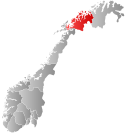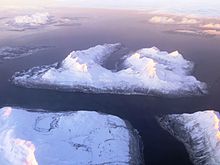Andørja Municipality
Andørja Municipality
Andørja herred | |
|---|---|
 Andørja viewed from Harstad | |
 Troms within Norway | |
 Andørja within Troms | |
| Coordinates: 68°48′53″N 17°17′41″E / 68.81472°N 17.29472°E | |
| Country | Norway |
| County | Troms |
| District | Central Hålogaland |
| Established | 1 July 1926 |
| • Preceded by | Ibestad Municipality |
| Disestablished | 1 January 1964 |
| • Succeeded by | Ibestad Municipality |
| Administrative centre | Engenes |
| Area (upon dissolution) | |
| • Total | 135.4 km2 (52.3 sq mi) |
| • Rank | #455 in Norway |
| Highest elevation | 1,275.9 m (4,186.0 ft) |
| Population (1963) | |
| • Total | 1,343 |
| • Rank | #558 in Norway |
| • Density | 9.9/km2 (26/sq mi) |
| • Change (10 years) | |
| Demonym | Andørja-folk[2] |
| Official language | |
| • Norwegian form | Bokmål[3] |
| Time zone | UTC+01:00 (CET) |
| • Summer (DST) | UTC+02:00 (CEST) |
| ISO 3166 code | NO-1916[5] |
Andørja is a former municipality in Troms county in Norway. The 135-square-kilometre (52 sq mi) municipality existed from 1926 until its dissolution in 1964. The area now makes up the northeastern half of Ibestad Municipality. It encompassed the entire island of Andørja plus a number of other small islands and skerries surrounding it. The administrative centre was located at Engenes where the Andørja Church was also located.[6]
Prior to its dissolution in 1964, the 135.4-square-kilometre (52.3 sq mi) municipality was the 455th largest by area out of the 689 municipalities in Norway. Andørja Municipality was the 558th most populous municipality in Norway with a population of about 1,343. The municipality's population density was 9.9 inhabitants per square kilometre (26/sq mi) and its population had decreased by 3.5% over the previous 10-year period.[7][8]
General information
[edit]

The municipality of Andørja was established on 1 July 1926 when the large Ibestad Municipality was separated into four municipalities: Ibestad Municipality (population: 1,768), Andørja Municipality (population: 1,420), Astafjord Municipality (population: 1,018), and Gratangen Municipality (population: 1,967). During the 1960s, there were many municipal mergers across Norway due to the work of the Schei Committee. On 1 January 1964, there was a merger where Andørja Municipality (population: 1,330) and Ibestad Municipality (population: 1,821) were merged with the part of neighboring Skånland Municipality that was located on the island of Rolla (population: 134) to form the new, larger Ibestad Municipality.[9]
Name
[edit]The municipality is named after the island of Andørja (Old Norse: Andyrja). The meaning of the name is not certain, but one theory is that the first element and which means "against". The last element is yrja which means "gravel" or "rocks", possibly referring to the waves from the sea hitting against the rocky shores.[10][11]
Churches
[edit]The Church of Norway had one parish (sokn) within Andørja Municipality. It was part of the Ibestad prestegjeld and the Trondenes prosti (deanery) in the Diocese of Nord-Hålogaland.
| Parish (sokn) | Church name | Location of the church | Year built |
|---|---|---|---|
| Andørja | Andørja Church | Engenes | 1914 |
Geography
[edit]The highest point in the municipality is the 1,275.9-metre (4,186 ft) tall mountain Langlitinden.[1]
Government
[edit]While it existed, Andørja Municipality was responsible for primary education (through 10th grade), outpatient health services, senior citizen services, welfare and other social services, zoning, economic development, and municipal roads and utilities. The municipality is governed by a municipal council of directly elected representatives. The mayor is indirectly elected by a vote of the municipal council.[12] The municipality was under the jurisdiction of the Hålogaland Court of Appeal.
Municipal council
[edit]The municipal council (Herredsstyre) of Andørja was made up of 17 representatives that were elected to four year terms. The tables below show the historical composition of the council by political party.
| Party name (in Norwegian) | Number of representatives | |
|---|---|---|
| Christian Democratic Party (Kristelig Folkeparti) | 2 | |
| Local List(s) (Lokale lister) | 15 | |
| Total number of members: | 17 | |
| Note: On 1 January 1964, Andørja Municipality became part of Ibestad Municipality. | ||
| Party name (in Norwegian) | Number of representatives | |
|---|---|---|
| Local List(s) (Lokale lister) | 17 | |
| Total number of members: | 17 | |
| Party name (in Norwegian) | Number of representatives | |
|---|---|---|
| Labour Party (Arbeiderpartiet) | 3 | |
| Local List(s) (Lokale lister) | 13 | |
| Total number of members: | 16 | |
| Party name (in Norwegian) | Number of representatives | |
|---|---|---|
| Labour Party (Arbeiderpartiet) | 6 | |
| Local List(s) (Lokale lister) | 10 | |
| Total number of members: | 16 | |
| Party name (in Norwegian) | Number of representatives | |
|---|---|---|
| Local List(s) (Lokale lister) | 16 | |
| Total number of members: | 16 | |
| Party name (in Norwegian) | Number of representatives | |
|---|---|---|
| Joint List(s) of Non-Socialist Parties (Borgerlige Felleslister) | 10 | |
| Local List(s) (Lokale lister) | 2 | |
| Total number of members: | 12 | |
| Note: Due to the German occupation of Norway during World War II, no elections were held for new municipal councils until after the war ended in 1945. | ||
Mayors
[edit]The mayor (Norwegian: ordfører) of Andørja was the political leader of the municipality and the chairperson of the municipal council. Here is a list of people who have held this position:[19]
See also
[edit]References
[edit]- ^ a b "Høgaste fjelltopp i kvar kommune" (in Norwegian). Kartverket. 16 January 2024.
- ^ "Navn på steder og personer: Innbyggjarnamn" (in Norwegian). Språkrådet.
- ^ "Norsk Lovtidende. 2den Afdeling. 1932. Samling af Love, Resolutioner m.m". Norsk Lovtidend (in Norwegian). Oslo, Norway: Grøndahl og Søns Boktrykkeri: 453–471. 1932.
- ^ "Forskrift om målvedtak i kommunar og fylkeskommunar" (in Norwegian). Lovdata.no.
- ^ Bolstad, Erik; Thorsnæs, Geir, eds. (26 January 2023). "Kommunenummer". Store norske leksikon (in Norwegian). Kunnskapsforlaget.
- ^ Thorsnæs, Geir, ed. (28 February 2018). "Andørja - tidligere kommune". Store norske leksikon (in Norwegian). Kunnskapsforlaget. Retrieved 29 July 2018.
- ^ Statistisk sentralbyrå. "Table: 06913: Population 1 January and population changes during the calendar year (M)" (in Norwegian).
- ^ Statistisk sentralbyrå (1 January 1951). Norges Sivile, Geistlige, Rettslige og Militære Inndeling 1. Januar 1951 (PDF). Norges Offisielle Statistikk (in Norwegian). Oslo, Norge: H. Aschehoug & Co.
- ^ Jukvam, Dag (1999). "Historisk oversikt over endringer i kommune- og fylkesinndelingen" (PDF) (in Norwegian). Statistisk sentralbyrå.
- ^ Thorsnæs, Geir, ed. (28 February 2018). "Andørja - øy". Store norske leksikon (in Norwegian). Kunnskapsforlaget. Retrieved 29 July 2018.
- ^ Rygh, Oluf (1911). Norske gaardnavne: Tromsø amt (in Norwegian) (17 ed.). Kristiania, Norge: W. C. Fabritius & sønners bogtrikkeri. p. 49.
- ^ Hansen, Tore; Vabo, Signy Irene, eds. (20 September 2022). "kommunestyre". Store norske leksikon (in Norwegian). Kunnskapsforlaget. Retrieved 14 October 2022.
- ^ "Kommunevalgene og Ordførervalgene 1959" (PDF) (in Norwegian). Oslo: Statistisk sentralbyrå. 1960. Retrieved 18 March 2020.
- ^ "Kommunevalgene og Ordførervalgene 1955" (PDF) (in Norwegian). Oslo: Statistisk sentralbyrå. 1957. Retrieved 18 March 2020.
- ^ "Kommunevalgene og Ordførervalgene 1951" (PDF) (in Norwegian). Oslo: Statistisk sentralbyrå. 1952. Retrieved 18 March 2020.
- ^ "Kommunevalgene og Ordførervalgene 1947" (PDF) (in Norwegian). Oslo: Statistisk sentralbyrå. 1948. Retrieved 18 March 2020.
- ^ "Kommunevalgene og Ordførervalgene 1945" (PDF) (in Norwegian). Oslo: Statistisk sentralbyrå. 1947. Retrieved 18 March 2020.
- ^ "Kommunevalgene og Ordførervalgene 1937" (PDF) (in Norwegian). Oslo: Statistisk sentralbyrå. 1938. Retrieved 18 March 2020.
- ^ Eriksen, Hilmar (1981). Det gamle Astafjord og Ibestad. 1 : Tingsoknet og kirkesoknet (in Norwegian).

